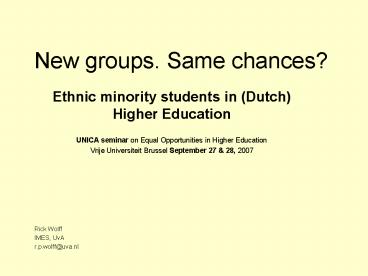New groups. Same chances? PowerPoint PPT Presentation
1 / 20
Title: New groups. Same chances?
1
New groups. Same chances?
- Ethnic minority students in (Dutch) Higher
Education - UNICA seminar on Equal Opportunities in Higher
Education - Vrije Universiteit Brussel September 27 28,
2007 - Rick Wolff
- IMES, UvA
- r.p.wolff_at_uva.nl
2
Diversity and Equality in Higher Education
- Ethnic background
- Student population
3
Outline
- Dutch situation (dropout/completion)
- UCLA Academic Advancement Program
4
About the Dutch data
- Data-source Information Management Group
(national database over 728.000 FT-students) - Definition non-Western descent at least 1 parent
born in non-Western country (Statistics
Netherlands) - Enrolment NL-residents, no HE-experience
- Dropout -dropout the first 2 years of study of
an enrolments cohort (switch is no drop out) - Completion rate -graduations within 6 years of
an enrolment cohort
5
The road to Dutch Higher Education
6
Number of HBO-enrolments of non-Western groups
7
University enrolment, non-Western FT-studenten by
ethnic group
- Brongegevens IBG
- Bewerking IMES
8
HBO-enrolments FT-students 18 years old or
younger by ethnic group ( of total)
- Brongegevens IBG
- Bewerking IMES
9
HBO-dropout rates FT-students within the first 2
years of study by ethnic group
- Brongegevens IBG
- Bewerking IMES
10
HBO-completion rates within 6 years, FT-studenten
by ethnic group
- Brongegevens IBG
- Bewerking IMES
11
HBO-completion rates within 6 years, FT-students
by ethnic group and preparatory school
- Brongegevens IBG
- Bewerking IMES
12
University completion rates within 6 years of
study, FT-students by ethnic group
- Brongegevens IBG
- Bewerking IMES
13
Some explanations
- Students
- Learning environments
- (course programs/institutions)
14
General factors strengthened among non-Western
students?
- Background (first generation entrants, students
from low income groups) - Choice of course program (HE-preparation)
- Networking skills (asking for advice or
assistance/support)
15
Specific factors
- Language (study skills)
- Interethnic relations (social and academic
integration, Vincent Tinto) - Ethnic minority students feel less at home
(Severiens, Wolff, Rezai 2006)
16
What can HE-institutions do?
17
(No Transcript)
18
Which elements of the learning environmentstimula
te study progress of minority ethnic students?
- Small-scale teaching (commitment of both students
and teachers personal approach, social and
academic engagement) - Consequent implementation (study groups,
program-composition, preparing teachers) - Diversity in learning communities
19
UCLA Academic Advancement Program
- Program for first generation students (SES-based)
- Mostly Latino students
- Pedagogy of Excellence (since mid 80s)
- Bridging/Transition
- Summer Courses
- Mentoring/Tutoring/Counselling
- AAP-Family
20
(No Transcript)

